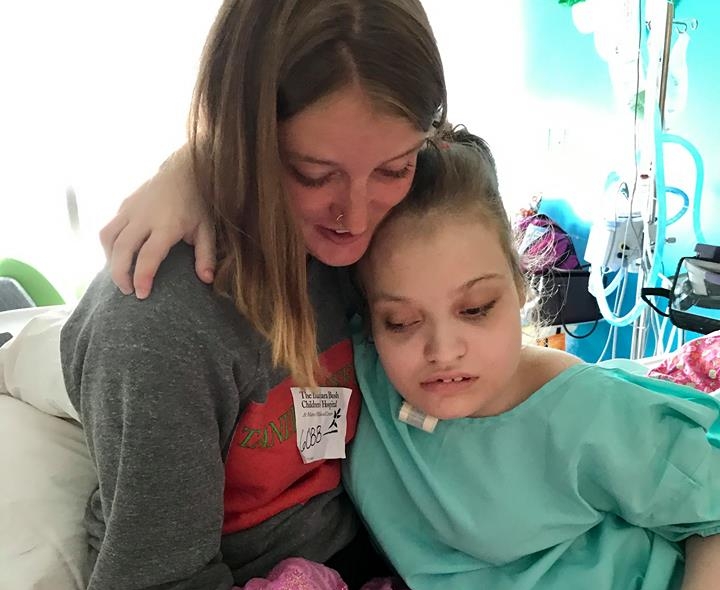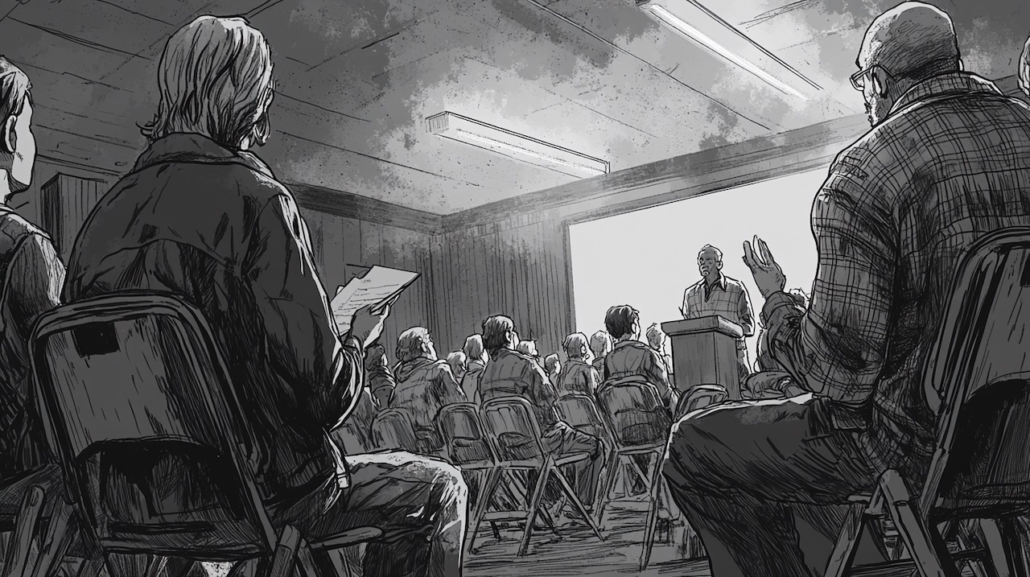Remembering Katiebug: A short, bright local light

Katie with her older sister, Julia, at the Barbara Bush Children’s Hospital, in Portland, during one of Katie’s many hospital visits this past year. (Contributed photo)
by Eric W. Austin
A child’s death, even when expected, is never easy.
“We’ve always lived with the idea that it could happen,” Sarah Watson, of Vassalboro, tells me. It’s November 6. Outside, the rain is coming down in torrents. It’s been two weeks since the death of Sarah’s daughter, Katie. She was 19.
“Even though you live with the possibility, it’s still shocking when it does happen,” she says. “We thought we had gotten past everything this summer, so even though we were prepared for it, we weren’t.”
Katherine Grace Christina White – Katie or Katiebug to everyone who knew her – was a fighter from the moment of her conception. She had to be. While still in utero, doctors diagnosed her with acute spina bifida, a condition where the neural tube in the developing baby, which later becomes the central nervous system, does not form properly, resulting in part of the spinal cord growing outside the bony canal which normally protects it. The result is often full or partial paralysis.
Further, little Katie suffered from another fetal developmental defect that is commonly associated with spina bifida, Arnold Chiari Type II malformation, which occurs when the lower part of the brain, the cerebellum and the brain stem, extend beyond the base of the skull, impeding the flow of excess spinal fluid, leading to a build-up of fluid on the brain.
She wasn’t expected to live beyond the age of five.
“It was bad,” Sarah recalls. “She had paralysis. Along with that is, usually, hydrocephalus – which is fluid on the brain.”
Katie’s first year of life was touch and go. The surgical shunts inserted to drain the excess fluid and relieve pressure on her brain became infected. The trauma that resulted caused damage which stunted her cognitive development. “So,” her mother explains, “she was kind of stuck in that Sesame Street stage.”
But woe to anyone that might suggest these tragic beginnings should dictate the rest of her life. Through all her struggles, Katie displayed an infectious optimism which often lifted up the rest of her family.
“Even when she was in pain, even when she had an infection that would make any of us miserable, she was always smiling, saying ‘Hi!’ and giving everyone hugs,” Sarah remembers. “Her ability to be happy through the worst stuff was ridiculous. We would look at her and think, ‘I have no reason to be in a bad mood, because look at everything she’s dealing with, and she’s happy.’ That always taught me so much, because it’s so easy to get into the mentality of ‘Poor me! Why me?’ – all those things. But when you see this kiddo, who’s fighting for her life and still happy as hell, you think, ‘I need to check myself.’”
Katie loved the PBS children’s program Sesame Street. “She loved Elmo,” Sarah says, with her first real smile of the interview. “Gawd, this kid! She could literally mimic his laugh – it was so funny. She was just so happy all the time. So easy to please. People would say, ‘Oh, but her quality of life’ – and I’m like, are you kidding me? This kid was happy all the time. She had people that loved her; she was well-cared for. She really had the best quality of life.”
The last year of Katie’s life was a difficult one though. “I could have lost her years ago,” Sarah says quietly, almost to herself. “She’s been fragile all her life. We’ve been really lucky to have her as healthy as she was, to have kept her out of the hospital.”
It started with a bowel obstruction last fall. That quickly led to a blood infection which in turn led to a shunt infection. She was in and out of the hospital all year. Then in October, on another mad ambulance dash down to Portland’s Maine Medical Center, she suffered a seizure and became unresponsive. She hung on just long enough for her sister, Julia, who is attending college in New Jersey, to rush home to hold her hand and say good-bye.
The night of Katie’s passing, Sarah and her husband, Tyler, grabbing a quick dinner after an exhausting day at the hospital, talked about how to honor Katie’s memory. Sarah’s first inclination had been to donate her daughter’s organs. She hoped in that way some of the happiness Katie had brought into the world would continue after her. When the doctors told her it would not be possible because of the blood infections Katie had suffered in the last months of her life, Sarah was crushed. That night at dinner, the couple searched for another idea.
“I want to start a foundation to fund medical equipment for sick kids,” Sarah said suddenly. Tyler smiled. “That’s a great idea,” he agreed immediately. “Let’s do that!”
One of the on-going struggles of Katie’s life – and that of her parents’ – was the constant fight with insurance companies to cover needed care. For the past two years, the family had been trying to gain approval for the purchase of a new hospital bed for Katie. The bed she had was nearly as old as she was and, according to her mother, “being held together by zip ties.” It was so ancient, in fact, that the parts needed for repair could no longer be ordered.
Sarah and Tyler decided the best way to honor Katie’s memory was to help other parents avoid those same kinds of stressful encounters. They set up a GoFundMe webpage to begin raising money and scheduled an appointment with an attorney to get to work setting up a 501(c)(3) nonprofit.
The response to her GoFundMe campaign was surprising and swift. Friends and family, neighbors and co-workers rallied behind her. A tweet she sent out around election day went viral. It was retweeted nearly 3,000 times (including by actress Patricia Arquette) and garnered more than 12,000 likes. As of this writing, they have raised $8,820 of their initial goal of $10,000, with another $5,000 promised by a private donor once the foundation is set up.
The meeting with the lawyer, on the other hand, was a bit of a wake-up call. “Honestly,” Sarah told me afterwards, “the process is daunting and expensive. I have to form a board of directors if I want to have tax exempt status, and it has to be non-familial, which makes it more difficult than I expected.”
But one thing parents of disabled children have in abundance is determination. “Katie overcame obstacles every single day of her life and she did it with a smile,” Sarah Watson insisted fiercely. “For me to give up because it got tough would be the opposite of what she embodied.”
The Watson family aims to have the Katherine G. White Foundation up and running by the end of the year. Local parents of disabled children looking for financial help, those wanting to donate to the cause or get involved are encouraged to contact them by email at KGWFoundation@gmail.com. They are also currently looking for conscientious community members to serve on the foundation’s board of directors.
After spending nearly 20 years raising a disabled child of her own, I asked Sarah if she had any advice to pass on to parents in a similar situation.
“Don’t ever give up,” she tells me. “If you run into a wall, get a sledgehammer. If there isn’t a way, if it doesn’t exist, create it. Nurses are your best friends, and nobody has your best interests at heart more than you do. Learn to question. Demand a second opinion. Be your own advocate.”
Where does Sarah Watson get the determination and strength to keep on keepin’ on in the face of so much adversity? Why, from Katie, of course. “Her determination and happiness,” Sarah says, “even when she was sick, were such an inspiration.”
Eric W. Austin writes about technology and community issues. He can be reached by email at ericwaustin@gmail.com.
Responsible journalism is hard work!
It is also expensive!
If you enjoy reading The Town Line and the good news we bring you each week, would you consider a donation to help us continue the work we’re doing?
The Town Line is a 501(c)(3) nonprofit private foundation, and all donations are tax deductible under the Internal Revenue Service code.
To help, please visit our online donation page or mail a check payable to The Town Line, PO Box 89, South China, ME 04358. Your contribution is appreciated!





Leave a Reply
Want to join the discussion?Feel free to contribute!